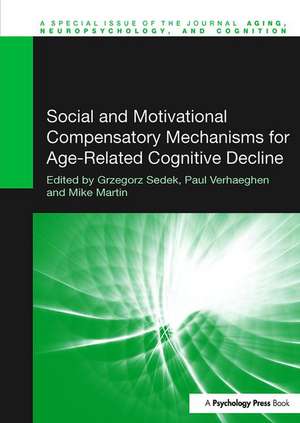Social and Motivational Compensatory Mechanisms for Age-Related Cognitive Decline: Special Issues of Aging, Neuropsychology and Cognition
Editat de Grzegorz Sedek, Paul Verhaeghen, Mike Martinen Limba Engleză Paperback – 24 mai 2017
This book examines the role of compensatory mechanisms in such diverse facets of cognitive processing as perceptual processes, text comprehension, dual-task processing, and episodic and prospective memory. This ensemble of studies compellingly shows that older adults’ everyday cognitive life is governed not by the decline in elementary cognitive processes as measured in the lab, but by a multitude of compensatory mechanisms, most of which are of the social/motivational variety. Much of this compensatory behavior can be elicited with no or only little experimental prodding, underscoring the self-organizing or self-initiated nature of this type of behavior, even in advanced old age.
This book was originally published as a special issue of Aging, Neuropsychology and Cognition.
| Toate formatele și edițiile | Preț | Express |
|---|---|---|
| Paperback (1) | 299.52 lei 6-8 săpt. | |
| Taylor & Francis – 24 mai 2017 | 299.52 lei 6-8 săpt. | |
| Hardback (1) | 766.42 lei 6-8 săpt. | |
| Taylor & Francis – 16 aug 2012 | 766.42 lei 6-8 săpt. |
Preț: 299.52 lei
Preț vechi: 356.64 lei
-16% Nou
Puncte Express: 449
Preț estimativ în valută:
57.32€ • 62.24$ • 48.15£
57.32€ • 62.24$ • 48.15£
Carte tipărită la comandă
Livrare economică 23 aprilie-07 mai
Preluare comenzi: 021 569.72.76
Specificații
ISBN-13: 9781138115866
ISBN-10: 113811586X
Pagini: 352
Dimensiuni: 174 x 246 mm
Greutate: 0.45 kg
Ediția:1
Editura: Taylor & Francis
Colecția Psychology Press
Seria Special Issues of Aging, Neuropsychology and Cognition
Locul publicării:Oxford, United Kingdom
ISBN-10: 113811586X
Pagini: 352
Dimensiuni: 174 x 246 mm
Greutate: 0.45 kg
Ediția:1
Editura: Taylor & Francis
Colecția Psychology Press
Seria Special Issues of Aging, Neuropsychology and Cognition
Locul publicării:Oxford, United Kingdom
Public țintă
Postgraduate, Professional, and UndergraduateCuprins
1. Reconnecting cognition in the lab and cognition in real life: The role of compensatory social and motivational factors in explaining how cognition ages in the wild 2. Mood, motivation, and misinformation: Aging and affective state influences on memory 3. Positive effects of subclinical depression in prospective memory and ongoing tasks in young and old adults 4. The age prospective memory paradox within the same sample in time-based and event-based tasks 5. Age benefits in everyday prospective memory: The influence of personal task importance, use of reminders and everyday stress 6. Bingo! Externally-supported performance intervention for deficient visual search in normal aging, Parkinson’s Disease and Alzheimer’s Disease 7. The Effects of print exposure on sentence processing and memory in older adults: Evidence for efficiency and reserve 8. Successful adaptation of gait in healthy older adults during dual-task treadmill walking 9. Plasticity of prospective memory through a familiarization intervention in old adults 10. Brain training in older adults: Evidence of transfer to memory span performance and pseudo-Matthew effects 11. Age and practice-related influences on dual-task costs and compensation mechanisms under optimal conditions of dual-task performance 12. Cognitive function, physical activity and aging: Possible biological links and implications for multimodal interventions 13. Aging and perceived event structure as a function of modality 14. The relationship between need for closure and memory for schema-related information among younger and older adults 15. Age-related schema reliance of judgments of learning in predicting source memory 16. Semantic encoding enhances the pictorial superiority effect in the oldest-old
Descriere
This book examines the role of compensatory mechanisms in such diverse facets of cognitive processing as perceptual processes, text comprehension, dual-task processing, and episodic and prospective memory. It was originally published as a special issue of Aging, Neuropsychology and Cognition.








